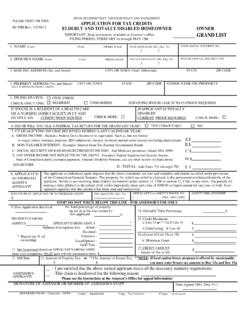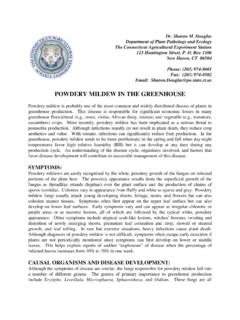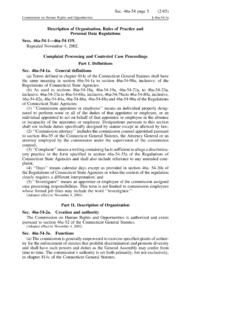Transcription of CJIS DICTIONARY OF - Connecticut
1 cjis DICTIONARY OF LAW ENFORCEMENT, TECHNICAL, AND AGENCY TERMINOLOGY AND NATIONAL AND LOCAL CRIMINAL JUSTICE AGENCIES CRIMINAL JUSTICE ACTS, LAWS AND STATUTES VERSION 1 UPDATED: APRIL 2, 2014 2 | P a g e Contents Criminal Justice DICTIONARY .. 3 Criminal Justice Agencies and 33 National Agencies .. 40 Technical Definitions .. 41 Connecticut Statutes .. 46 CGS 54-142s (CISS) .. 46 CGS 54-142g (Criminal Justice Agency) .. 48 CGS 54-142q ( cjis Governing Board) .. 49 Authorized Sentences:.. 51 Probation and Conditional Discharge .. 52 Laws and Acts .. 55 Related Documentation Links: .. 57 3 | P a g e Criminal Justice DICTIONARY To help clarify terminology when working with stakeholders and cjis employees, the following living list is being provided and will be continually updated.
2 So far, this table includes some terms that might be incorrectly used interchangeably while in discussions about CISS. Term Definition Example Notes Abscond Abscond is generally used to describe someone running from law or capture. He was put into jail but absconded within a few days. Reference: SR? See also: Probation Absconder Administration of Criminal Justice The Administration of Criminal Justice is the detection, apprehension, detention, pre-trial release, post-trial release, prosecution, adjudication, correctional supervision, or rehabilitation of accused persons or criminal offenders. It also includes criminal identification activities; the collection, storage, and dissemination of criminal history record information; and criminal justice employment.
3 In addition, administration of criminal justice includes crime prevention programs to the extent that access to the criminal history record information is limited to law enforcement agencies for law enforcement programs ( record checks of individuals who participate in Neighborhood Watch or safe house programs) and the result of such checks will not be disseminated outside the law enforcement agency Affiant An affiant is any person having the intellectual capacity to take an oath or make an affirmation and who has knowledge of the facts that are in dispute to make an affidavit. There is no age requirement for an affiant.
4 As long as a person is old enough to understand the facts and the significance of the oath or affirmation he or she makes, the affidavit is valid. A criminal conviction does not make a person incapable of making an affidavit, but an adjudication of incompetency does. Someone familiar with the matters in question may make an affidavit on behalf of another, but that The two detectives completed the search warrant affidavit and swore to its contents as the affiants of the search warrant before the judge. Reference: Criminal Justice DICTIONARY 4 | P a g e Term Definition Example Notes person's authority to do so must be clear.
5 A guardian may make an affidavit for a minor or insane person incapable of doing so. An attorney may make an affidavit for a client if it is impossible for the client to do so. When necessary to the performance of duties, a personal representative, agent, or corporate officer or partner may execute an affidavit that indicates the capacity in which the affiant acts. A court cannot force a person to make an affidavit, since, by definition, an affidavit is a voluntary statement. Affidavit An affidavit is a written statement of facts voluntarily made by an affiant under an oath or affirmation administered by a person authorized to do so by law.
6 An affidavit is voluntarily made without any cross-examination of the affiant and, therefore, is not the same as a deposition, a record of an examination of a witness or a party made either voluntarily or pursuant to a subpoena, as if the party were testifying in court under cross-examination. The officer completed the affidavit for an arrest warrant. Reference: See also: Custody affidavit AFIS Automated Fingerprint Identification System (AFIS) is the process of automatically matching one or many unknown fingerprints against a database of known and unknown prints. Automated fingerprint identification systems are primarily used by law enforcement agencies for criminal identification initiatives, the most important of which include identifying a person suspected of committing a crime or linking a suspect to other unsolved crimes.
7 The subject was fingerprinted on a LiveScan station and his fingerprints were submitted to AFIS. The officer decided that the subject had given him a false name when AFIS determined the fingerprints belonged John Smith not Joe Martin. Reference: See also: Cogent LiveScan Alford Plea An Alford plea, also called a Kennedy plea in West Virginia,[1] an Alford guilty plea, and the Alford doctrine is a guilty plea in criminal whereby a defendant in a criminal case does not admit the criminal act and asserts innocence. In entering an Alford plea, the defendant admits that the evidence that the prosecution has would be likely to persuade a judge or jury to find the defendant guilty beyond a reasonable doubt.
8 5 | P a g e Term Definition Example Notes Arson Arson is when a person starts a fire with intent to destroy or damage a building. Arrest An arrest is when someone is taken into custody in violation of the law. The person is formally seized: you don t have to say or do anything to arrest someone. An arrest is not the same thing as being detained. Two types of arrest documents: Uniform Arrest Reports Summons The subject was taken into custody and placed under arrest. Reference: Arrest Warrant An arrest warrant is a warrant issued by a judge on behalf of the state, which authorizes the arrest and detention of an individual, or the search and seizure of an individual's property.
9 The officer submitted an arrest warrant to court, which was approved by the prosecutor and a judge. Upon receiving the arrest warrant, the officer located and arrested the subject of the warrant. Reference: See also: Warrant Bench Warrant Execution Warrant Search Warrant Assault A person by means of a deadly weapon or dangerous instrument causes serious physical injury to another person. Assault Weapon An Assault Weapon is any selective-fire firearm capable of fully automatic, semiautomatic or burst fire at the option of the user or any of the specified semiautomatic firearms name in 53-202a. Bench Warrant A bench warrant is a set of court papers issued by the judge, "from the bench," for the arrest of a person.
10 See also: Warrant Arrest Warrant Execution Warrant Search Warrant Bond A bond, also called bail, is money or property given to the court for the temporary release of a defendant, to ensure that the defendant will return to court. There are two kinds of bonds: Non-financial bonds: Reference: 6 | P a g e Term Definition Example Notes a) Non-surety bond where the defendant's signature alone guarantees the amount of bond and the defendant is not required to post any property or retain the services of a professional bail bondsperson as collateral. b) Promise to appear. Surety bond: The court requires cash, real estate or a professional bail bond person s signature as collateral before releasing the defendant back into the community.













